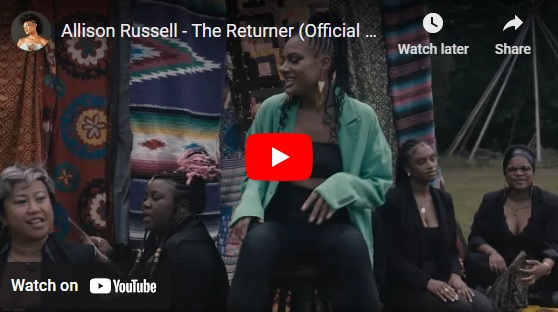After two decades of playing in various bands, including Po’ Girl, Birds of Chicago, and Our Native Daughters, Allison Russell’s 2021 debut solo album Outside Child was a breakthrough success, garnering universal acclaim for Russell’s grace and grit in writing about child abuse.
With Outside Child, Russell earned three Grammy nominations; a 2022 Americana Award; two International Folk Music Awards; a 2022 JUNO Award (she’s the first Black artist to win a Contemporary Roots Album of the Year in JUNO history); three Canadian Folk Music Awards; and two UK Americana Music Awards. She’s performed on Jimmy Kimmel Live!, Ellen, Late Night with Stephen Colbert, CBS Saturday Morning, Austin City Limits, and The Kelly Clarkson Show.
In addition, Russell has made her Grand Ole Opry debut, appeared at the Country Music Hall of Fame, and performed at the 2022 Grammys Premiere Ceremony. She was also part of the “Joni Jam” Joni Mitchell performances at the 2023 Newport Folk Festival and at The Gorge Amphitheatre in Washington. Now, she’s back with The Returner, released Sept. 8, 2023, the second album of an intended trilogy.
Whereas Outside Child was about stopping the cycle of abuse, The Returner is about reclaiming the present despite one’s troubles. “It’s about being re-embodied,” Russell says. “It’s about embracing this human experience that we are all living right now, in the here and now, and understanding that our joy and celebration is also a powerful force against systems of oppression.”
The Returner is indeed a joyful celebration, consciously made through circle work – labour based on equality and power-sharing between participants. “I want people to know that this is very much circle work,” Russell says, “It took circle work to create this record. Every single woman on the record contributed above and beyond. There’s no such thing as a side player in this project or on this record, or when we’re playing live. We are always working in circle, standing shoulder-to-shoulder.”
The record features Russell’s “Rainbow Coalition” band of all-female musicians, and includes special guests Wendy & Lisa, Brandi Carlile, Brandy Clark, and Hozier. Russell took great joy in stepping into the role of co-producer along with Dim Star (the nom de plume of Russell’s real-life partner J.T Nero and Drew Lindsay), all of whom co-wrote the album’s ten tracks.
Russell says, “I really wrote these songs for the circle of women who could bring them to life. I knew they would be able to elevate the music. I knew what everyone was capable of vocally. I knew I wanted to do a lot of call-and-response and choral work on this record, to sonically reinforce that feeling of one-on-one. You know, we’re in this together.”
That feeling of togetherness is evident in the opening song, the warm and uplifting “Springtime.” It begins with Russell, joined by a chorus of jubilant voices, saying goodbye to the metaphorical darkness in favour of the transcendent light. In the title song, Russell bids farewell to her tragic past as she triumphantly sings about returning to her true nature.
“Our joy and celebration is also a powerful force against systems of oppression”
If ever there was an anthem for those sitting (or dancing) through their emotional pain, “Stay Right Here” is it. It’s a euphoric disco-esque dance number with an undeniable groove, and lyrics that speak to the power of resisting the temptation to dissociate. Says Russell, “It’s choosing every day to stay present, to stay here, to not need this siren song of oblivion and self-hatred, and not caving into the sort of brainwashing of hateful, toxic hierarchies and ideologies that have been pushed on all of us during various parts of our lives.”
Maybe I’m swimming in happiness
But it’s an ocean of tears in my mind
All that my body can never forget
Why do good things make me cry?
Oooh, they make me wanna fly on back
Through that Hole in the sky
One of Russell’s favourite moments occurred during the writing of “All Without Within.” “Drew [Lindsay] had sent me this wonderful kind of rhythmic track, and it just got me,” she says. “It just sort of opened the gates to the subconscious, and I was able to step into the slipstream, so to speak.” On a long walk with her dog in Shelby Bottoms, a nature reserve in Nashville, Russell wrote the lyrics “I love the smell of rain on dead leaves / Your arms ‘round me when I’m angry,” in response to the scenery around her. “It felt like that walk really became a part of the song, the lyric, and the rhythm,” she says. “We ended up making adjustments to the rhythmic approach based on what I wrote on that walk.”
In the haunting “Snakelife,” Russell sings about survivor’s joy, and overcoming her desire to shed her Black skin. She sings of owning her identity and wearing her scars and bruises like “Botswana jewels.”
Where Russell once escaped her trauma in a dreamland of her imagination, she now writes songs that strive to create a better world for herself and others. After all, she has a nine-year-old to consider. “My prime motivator these days is my daughter,” she says. “Things that I would accept for myself, I can’t accept for her.” The central message of The Returner is that resilience is worth celebrating. But Russell is not content to reap the rewards of healing just for herself. Rather, she wants us all to come along for the ride. As she says, “We are all returners.”
I used to dream but now I write
I wield my words like spindles bright
To weave a world where every child
Is safe and loved
Is safe and loved
Is safe and loved
And Black is beautiful and good
